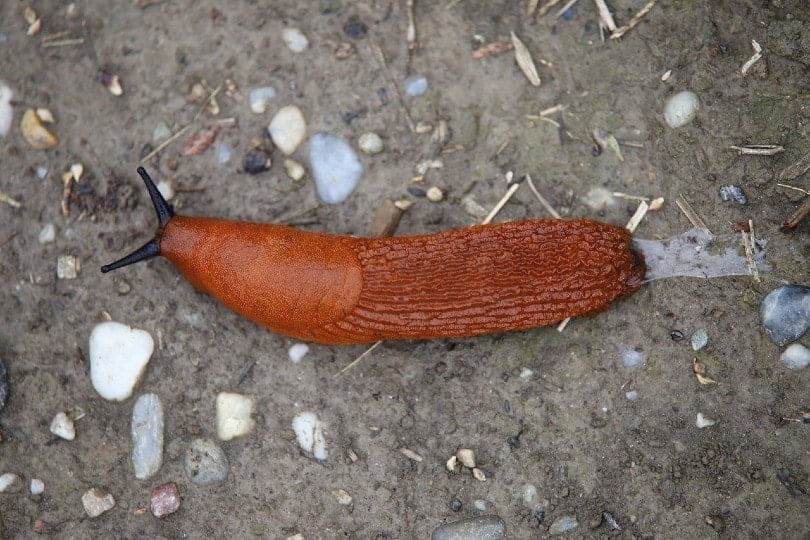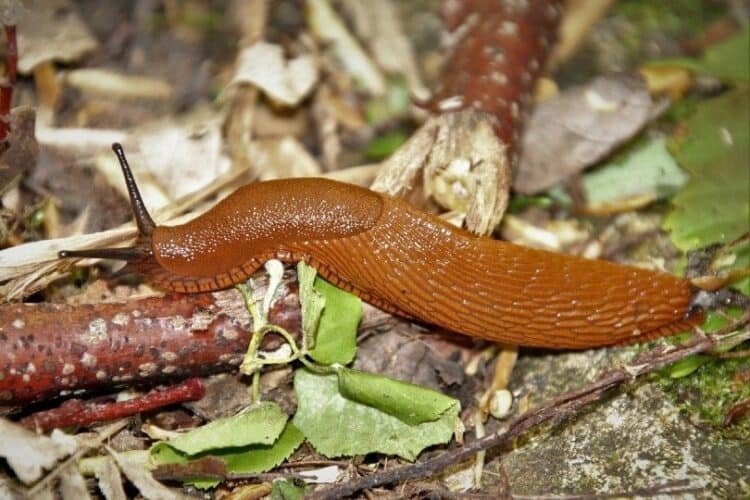While you may steer clear of the slimy, gross slugs you find in your yard, your dog may not do the same. While they’re nosing around in the dirt and doing some digging, they may ignore the foul-tasting substance slugs release and pop one in their mouth and swallow it.
You should know that slugs themselves aren’t toxic or poisonous to dogs but eating them can be harmful to dogs due to a parasite they can carry. The parasite some slugs carry can cause lungworms in dogs. If your dog ingests a lungworm parasite carried by a slug, it could develop serious health issues, including heart and breathing problems and hemorrhaging of the eyes, intestines, lungs, liver, and spine.
Even the slime trail a slug leaves behind while traveling can carry the lungworm parasite, which means a dog can become infected by ingesting the slime.
What to Do If Your Dog Eats a Slug
Despite its name, the lungworm parasite lives in the heart and blood vessels of an infected dog where it lays eggs that get carried to the lungs. Lungworm can be fatal if it goes undetected and isn’t treated in time.
If you know that the slugs in your area can potentially carry the lungworm parasite and your dog eats a slug, call your veterinarian for advice. You may be told to keep a close eye on your dog and to report back with any symptoms you see.
Symptoms of a Lungworm Infection in Dogs
It’s important to know that a dog may or may have any symptoms of a lungworm infection, and sometimes, an infected dog may act perfectly fine. However, if your dog gets infected by lungworm, they’re likely to act unusually. Some signs to watch for that can indicate a lungworm infection include:
- Diarrhea
- Weight Loss
- Coughing
- Wheezing
- Lack of appetite
- Nose bleeds
- Red eyes
- Vomiting
- Fatigue and lack of interest in playing

Lungworm Treatment
If your vet has detected a lungworm infestation by testing your dog’s blood or feces, an anti-parasitic medication will likely be prescribed to kill the worms and their larvae. Your dog may also be given an anti-inflammatory medication for the duration of the treatment to help with their symptoms.
How to Prevent Your Dog From Eating Slugs
There are a few things you can do to prevent your dog from eating slugs. If you know there are slugs in your yard where your dog plays, like your garden area, regularly check the area for these slimy creatures and end the infestation by using a pet-safe slug killer.
If you tend to leave your dog’s food and water bowls outside at night, start bringing them in so slugs don’t contaminate them. Always give your dog fresh, clean water to drink instead of leaving old water in their outside water dish.
Final Thoughts
While slugs themselves are not poisonous to dogs, these slimy little creatures can cause harm if eaten because some may carry lungworm parasites. If you think your dog has eaten a slug and you know there are lungworms in your area, contact your vet right away.
It’s always best to stay on top of any possible health issues your dog faces. If your dog does get sick, early treatment is key to a quick and complete recovery!
Featured Image Credit: Pixabay
















